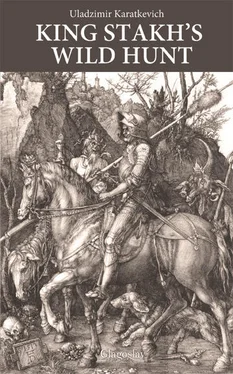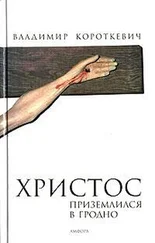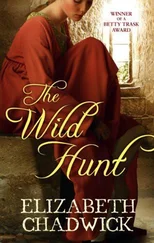But she appeared very soon after. Through the window a woman's face was looking at me, a face so dry it seemed like a skull tightly covered by yellow parchment. Grey plaits fell on her shoulders. Then a hand appeared, a hand resembling a hen's claw. The hand beckoned me with a wrinkled finger.
I stood in the yard not knowing whom this gesture was meant for.
The door opened a little and that very same hand pushed itself through the slit.
“Here, come in, kind sir, Mr. Hryhor,” the head pronounced, “here unfortunate victims are murdered.”
I cannot say that after such a consoling piece of information I had a great desire to enter the house, but the old woman walked down to the last step of the porch, reached out her hand to me across the puddle.
“I've long been awaiting you, our courageous deliverer. The thing is that my slave Ryhor has turned out to be a man who stifles people as did Bluebeard. You remember our reading together about Zhila the Bluebeard, such a gallant cavalier? I'd have forgiven Ryhor everything if he'd done his murdering just as gallantly, but he's a serf. So what can one do?”
I followed after her. In the anteroom was a sheepskin coat on the floor, next to it a saddle, on the wall a whip and a few hardened fox-skins. Besides that, a three-legged stool and the portrait of a man lying on its side, a portrait dirty and torn through and through. The room itself was in such a mess as if a branch of the Grunwald Battle had been located there 400 years ago, and since that time nothing in the room had ever been dusted, nor had the windows been washed. A crooked table with legs the shape of antique hermae, next to it an armchair resembling war veterans without legs and hardly breathing. At the wall a closet leaning over and threatening to fall down on the first person who came up to it. On the floor near the door a large bust of Voltaire bearing a resemblance to the mistress of the house. He looked at me coquettishly from under the rags which crowned his head instead of laurels. A cheval-glass was squeezed into one corner and something resembling bird-droppings covered it. Its upper half was covered with a thick layer of dust. To make up for that, its lower half was carefully wiped clean. Fragments of dishes, bread crumbs, fishbones were thrown about everywhere. All as in a kingfisher's nest, where the bottom is covered with fish scales. And the mistress herself reminded one of a kingfisher, that gloomy and strange bird that prefers solitude.
She turned towards me, and again I saw her face, saw a nose hanging down to her very chin, and enormous teeth.
“My Knight, wouldn't it be nice if you wiped off the dust from the upper half of the cheval-glass? I'd like to see myself in my full height... In all my beauty...”
I shifted from one foot to the other, hesitating, not knowing how to fulfil her request, but she said suddenly:
“You see, you greatly resemble my deceased husband. What a man he was! He was taken alive up to heaven, the first among men after the prophet Elijah. But Raman fell alive into the nether regions. All due to the evil genius of the Janoŭski region — King Stach's Wild Hunt. From the day my husband died, I stopped cleaning the house as a sign of mourning. Beautiful, isn't it? And so romantic!”
She smiled a coquettish smile and began making eyes at me according to the unwritten rules at aristocratic girls' boarding-schools: “Keep your eyes on the person talking with you, then to the side with a slight bending of the head, again at the person you are talking to, then at the upper corner of the room and down at the ground.”
This was a malicious parody on human feelings. It was all the same as if a monkey had unexpectedly begun performing Ophelia's song in its English original.
“It is beautiful here. Only frightening. Oh! How frightening!”
Suddenly she threw herself on the floor away from me and buried her head in a pile of some old rags.
“Away! Away with you! You are King Stach!”
The woman beat herself hysterically and shouted loudly. Horrified, I thought that such a fate probably awaited all the people in this region if the black wing of incomprehensible fear were to remain hanging over this land.
I was standing at a loss, when somebody's hand was laid on my shoulder and a man's rough voice said:
“Why are you here? Don't you see that she is a bit — not in her right mind? A wonder, isn't she?”
The fellow went to the ante-room, brought a portrait full of holes from there, and put it on the table. A middle-aged man was depicted in the portrait in a dress-coat and with a “Vladimir” [8] A “Vladimir” — an order given for services to the state.
in a button-hole.
Then he dragged the woman out from among the rags, seated her in front of the portrait.
“Mrs. Kulša, this is not King Stach, not at all. Mr. Fieldmarshal has come to take a look at our well-known local beauty. And King Stach — this one here in the portrait — is dead and cannot kill anybody.”
The woman looked at the portrait. Fell silent. The man took out a piece of bread from his bosom, bread as black as earth. The old woman started laughing happily. She began to pinch off bits of bread and put them in her mouth, but kept her eyes on the portrait.
“King Stach! My dear husband. Why do you turn up your nose?”
She either scratched the portrait or happily whispered something to him, continuing to eat her bread. It was possible to examine the unknown man. He was about 30 years old, in a peasant's cloth coat and in leather sandals. Tall he was, well-built, his chest powerful and bulging. Whiskers made his face look severe and somewhat harsh. This impression was strengthened by two little wrinkles between the eyebrows and widely-set burning eyes. A white felt hat was lowered down on his forehead. Something about him breathed of freedom, of the forest.
“You are Ryhor, aren't you? Kulša's watchman?”
“Yes,” he answered, irony in his voice. “And you, apparently, are Miss Janoŭskaja's guest. I've heard of such a bird. You sing well.”
“And are you always like that with her?” I showed at the old woman who was spitting on the portrait with great concentration.
“Always. She's been this way for two years already.”
“But why don't you take her to the district centre for treatment?”
“I pity her. Guests would come when she was in good health, but now not a single dog. The gentry! Our young ladies, to the devil with them...”
“But isn't it difficult for you?”
“No, not at all. If I'm a-hunting, then Zosia looks after her. Nor does she often play pranks. And demands nothing. Only bread, a lot of bread. She wants nothing else.”
He took out an apple from his pocket and offered it to the old woman.
“Highly respected lady, take this.”
“Don't want it,” eating her bread with gusto. “Everywhere poison, bread alone is pure, godly.”
“You see,” Ryhor said gloomily. “Once a day we force her to eat something cooked. Sometimes she bites my fingers: when we give her food — she grabs it... But she wasn't bad when young. Even if she were bad, we couldn't leave her to herself.”
And he smiled such a guilty, childish smile that I was surprised.
“But why is she like that?”
“Got frightened after Raman's death. They all live in fear, and I can tell you, for most of them it's what they deserve.”
“But how about Janoŭskaja?”
“It would be evil to speak badly about her. A kind woman. I'm sorry for her.”
I became bolder now, for I understood — this was not a traitor.
“Listen, Ryhor, I came here to ask you about something.”
“Ask away,” he said.
“I have decided to unravel this Wild Hunt of King Stach's. You understand. I've never seen a ghost, want to feel it with my own hands.”
Читать дальше



